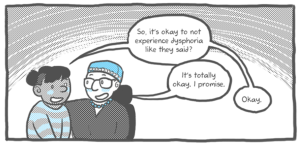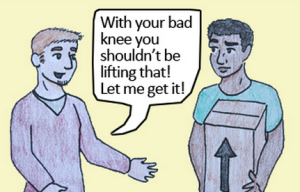
A family eats a holiday dinner together.
(Content Warning: eating disorders)
Some of my worst memories of my eating disorder took place during the winter holidays.
From purging after taking part in the Thanksgiving feast to starving myself before Christmas dinner to eating more than I even wanted because that was part of the celebration, this time of year makes recovery even harder.
American culture encourages disordered eating all year round, but during the holidays, it’s all out there.
For someone without an eating disorder, the disordered eating habits people exhibit around the holidays may seem like no big deal. They may be able to engage in them for a few days and then go back to their normal lives.
But they can contribute to eating disorders over time and with repetition, and they can be triggering to someone who already has an eating disorder or is in recovery.
Here are some ways we may unknowingly contribute to disordered eating during the holidays – and why we need to be more careful about them.
1. Encouraging Eating Beyond the Point of Fullness
What It Sounds Like:
- “Better get out your maternity pants!”
- “Time for seconds!”
- “Are we going to pig out tonight or what?”
Why It’s Triggering:
While we shouldn’t feel bad about eating beyond when we’re full, it can be destructive to encourage this behavior, since it leads us to ignore what our own bodies are telling us.
And when we expect people to unbutton their pants after the meal, get seconds and thirds, or feel sick at the end, that’s what we’re doing: asking people to tune out their body’s cues.
Part of eating disorder recovery is learning how to eat intuitively – based on internal signals, not external rules.
Over time, when people eat based on social convention rather than how they feel, they may have trouble sensing when they’re hungry and full so that they can eat intuitively – or they may not care because they’re so caught up with what they “should” or “shouldn’t” eat.
This can particularly be a problem for people with binge eating disorder, whose primary symptom is that they eat past the point of fullness. Telling them to stuff themselves is inviting their disorder to come back.
So, we can enjoy the typical Thanksgiving or Christmas feasts and holiday parties, but we should be conscious not to encourage people to eat when their stomachs tell them not to.
2. Complaining About How Much We’ve Eaten
What It Sounds Like:
- “I feel like I’m about to give birth to a food baby.”
- “We just ate a shameful amount of food.”
- “Wow, I really pigged out.”
Why It’s Triggering:
After people eat past the point of fullness during the holidays, it’s customary to complain about how much they’ve eaten and how disgusting they feel.
This can be triggering – if your mom feels “like a pig” for having the meal you just ate, too, what does that say about you? – and encourages destructive messages about food.
Even though eating disorder recovery usually involves intuitive eating, you should ideally feel okay about it if you do eat more than your body is telling you to. After all, it’s completely natural and normal to want food for the taste or sometimes for emotional or social reasons.
People in eating disorder recovery are working hard to get rid of food- and body-related shame, and openly feeling bad about how much you’ve eaten sends the message that those around the table should be ashamed.
Furthermore, expressing shame over eating a lot promotes the idea that it makes you undisciplined, greedy, or even immoral. Consuming a large meal for a holiday should have no moral connotations.
3. Talking About Making Up for Holiday Eating
What It Sounds Like:
- “Let’s go on a walk after dinner to work off everything we’ve eaten.”
- “We’re having a light lunch since we’re eating so much later.”
- “Eat what you can before your New Year’s resolution starts!”
- “My diet starts tomorrow!”
Why It’s Triggering:
When people complain about how “indulgent,” “sinful,” or “piggish” they’ve been, they often also talk about how they’ll start a diet after the holidays or hit the gym the next day.
Just look at people’s New Year’s resolutions: Weight loss is one of the most stereotypical.
Along the same lines, people sometimes encourage eating light right before holiday meals so that they deserve the “cheat.”
This furthers the punitive, moralistic idea that you need to “repent” for your supposedly excessive eating, and it can also start someone on a stressful cycle of binging and dieting.
If you eat intuitively after a festive feast, you’ll probably naturally eat less during the following days. And if you don’t and you end up gaining weight, that’s okay, too. If anything, that’s expected in winter, when weight gain protects against brutally cold temperatures.
It doesn’t make you less healthy or less attractive, and you don’t have any duty to be healthy or attractive in the first place.
4. Commenting on People’s Eating and Bodies
What It Sounds Like:
- “You look good! Did you lose weight?”
- “Wow – you’re having another cookie?
- “Are you sure that’s what size you wear?”
Why It’s Triggering:
Between greeting loved ones with commentary on their looks, evaluating what they’re eating – especially if they’re an eating disorder survivor who’s anxious about people trying to assess their recovery – and speculating on sizes for the purpose of gifts, just the prospect of visiting relatives can be stressful for an eating disorder survivor.
Among women, it’s almost customary to greet one another with comments about appearance. And this isn’t necessarily a bad thing if it’s kept to “You look beautiful” or “I love your jacket.”
But it’s best to keep size out of these comments.
When we compliment someone’s weight loss, we encourage the idea that weight loss is good, which it’s certainly not when it hurts your mental health.
Complimenting weight gain can also be destructive, since it can make an eating disorder survivor more self-conscious if they’ve found weight gain emotionally difficult.
And saying something like, “Did you get enough to eat?” or “What are you eating?” can also make someone self-conscious. It’s their responsibility and their treatment team’s to figure out what they’re going to eat, and trying to figure that out for them will only stress them out.
In addition, if you need to know someone’s clothing size, it’s best to ask them directly – don’t guess. Or, even better, get them a gift certificate or take them shopping so they can find clothes they’re truly comfortable wearing, because the same size won’t always fit someone. Or, to sidestep that issue, just get something that’s not clothes.
5. Making Eating a Social Obligation
What It Sounds Like:
- “Don’t you want to join everyone?”
- “Aunt Alice put a lot of effort into making your favorite dish.”
- “It’s Thanksgiving! You should be grateful for this meal – don’t waste it!”
- “Just try it. You don’t know what you’re missing.”
Why It’s Triggering:
Whether to participate in a group activity, show appreciation for someone who cooked, or show appreciation for the food itself, people often advocate eating beyond hunger for another reason: moral obligation.
This isn’t a fair expectation to place on someone.
Just because you’re not eating the same thing as everyone else doesn’t mean you’re not socializing with them. If somebody decides to cook a dish they think a family member would like, that should be – like any gift – given with no expectations. Whether or not you finish your latkes will have no effect on starving children. And it’s totally up to each person whether or not they try something.
Like anything you do with your body, what you eat and don’t eat should be fully up to you, and you should never feel pressured into a meal you didn’t consent to.
***
These behaviors can be triggering to eating disorder survivors especially, but don’t think you have license to go ahead with them as long as nobody in your family is prone to being triggered.
First of all, eating disorders are far more common than you’d think, and disordered eating is even more common. More people than you may realize could be hurt by your comments.
Secondly, these behaviors hurt us all. They lead us to obsess about food, make it more than it is, punish ourselves, and view our bodies negatively.
This ultimately takes away from the true purpose of the holidays.
When we’re focused on food, we’re not focusing on each other. When we’re mad at ourselves, we’re enjoying ourselves less. And when we’re holding people to obligations and nit-picking their behavior, we’re distancing ourselves from them.
So, this holiday season, reconsider your behavior around the dinner table – not just for the members of your family who might suffer from disordered eating, but also for yourself and everyone else.
[do_widget id=’text-101′]
Suzannah Weiss is a Contributing Writer for Everyday Feminism. She is a New York-based writer whose work has appeared in The Washington Post, Salon, Seventeen, Buzzfeed, The Huffington Post, Bustle, and more. She holds degrees in Gender and Sexuality Studies, Modern Culture and Media, and Cognitive Neuroscience from Brown University. You can follow her on Twitter @suzannahweiss.
Search our 3000+ articles!
Read our articles about:
Our online racial justice training
Used by hundreds of universities, non-profits, and businesses.
Click to learn more




















